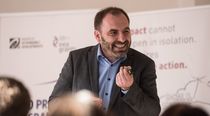Ivan Štefunko: We should focus on the realisation of ideas rather than on the ideas themselves
“A rapidly changing world is something foreign to us. Despite this, there are some of us who are eager to change things,” said Ivan Štefunko.

Is Slovakia a country of innovation?
“If you went out on the street and asked people whether Slovakia is a country of innovation, eight out of ten people would answer that Slovakia is not an innovative country. It is presumed, mainly in the regions that nothing changes in our country. And some of those people are even opposed to change,” mentioned Ivan Štefunko, managing partner of the Neulogy Ventures company, during the Corporate Philanthropy Forum aimed at social innovation.
Neulogy Ventures was founded by businessmen with the goal of providing venture capital and support for young entrepreneurs in start-ups who have the ambition to succeed in global markets. This is also a means of helping a new generation of businessmen to grow and have potential global impact.
“A rapidly changing world is something foreign to us. Despite the fact that our surroundings discourage and dissuade us from taking active steps for fear of not being able to live our comfortable lives, there are some of us who are eager to change things. The map of people who are changing Slovakia for the better is proof of that. I believe that the majority of people here want change and understand its necessity,” said I. Štefunko.
We should think more about the sustainability and impact of our projects
Public opinion surveys in Slovakia have revealed that we are a conservative country. “People here have rather conservative values and behave accordingly in their jobs, at school, in their environment as well as in politics,” stated Ivan Štefunko. Slovakia is a country that very often waits until its neighbours in the Czech Republic come up with something new and exciting – whether this be in business, science or education. Maybe we could also be the first ones to come up with our own ideas, even if that means that we may fail.
“We should concentrate more on the realisation of ideas rather than on the ideas themselvesin order to persuade the people who have the potential to finance a project. It is essential to think about the sustainability and impact of a project and about what the people who support it want to gain from it – and I am not talking about PR now.” According to Štefunko, the problem is not that people are unable to ask for money. It is more likely, that they attempt to get it through the wrong means and for unsustainable projects.
It is important to promote transparency, to have an open mind, not to be afraid of being inspired and to fight against the social exclusion of people from society. The most urgent priority is, however, to receive excellent education and to have a well-educated population. Companies have already registered a lack of skilled people, many talented individuals are leaving and if we don’t invest in the education system right now, it could well happen that we will face the consequences of this in several years.






